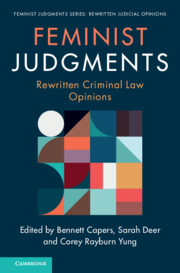59 results
Advisory Panel for Feminist Judgments Series
-
- Book:
- Feminist Judgments: Rewritten Criminal Law Opinions
- Published online:
- 01 December 2022
- Print publication:
- 15 December 2022, pp iv-iv
-
- Chapter
- Export citation
Notes on Contributors
-
- Book:
- Feminist Judgments: Rewritten Criminal Law Opinions
- Published online:
- 01 December 2022
- Print publication:
- 15 December 2022, pp xi-xx
-
- Chapter
- Export citation
Advisory Panel for Feminist Judgments: Rewritten Criminal Law Opinions
-
- Book:
- Feminist Judgments: Rewritten Criminal Law Opinions
- Published online:
- 01 December 2022
- Print publication:
- 15 December 2022, pp ix-x
-
- Chapter
- Export citation
Introduction and Overview
-
-
- Book:
- Feminist Judgments: Rewritten Criminal Law Opinions
- Published online:
- 01 December 2022
- Print publication:
- 15 December 2022, pp 1-4
-
- Chapter
- Export citation
Part II - Gender on Trial
-
- Book:
- Feminist Judgments: Rewritten Criminal Law Opinions
- Published online:
- 01 December 2022
- Print publication:
- 15 December 2022, pp 189-190
-
- Chapter
- Export citation
Contents
-
- Book:
- Feminist Judgments: Rewritten Criminal Law Opinions
- Published online:
- 01 December 2022
- Print publication:
- 15 December 2022, pp vii-viii
-
- Chapter
- Export citation
Copyright page
-
- Book:
- Feminist Judgments: Rewritten Criminal Law Opinions
- Published online:
- 01 December 2022
- Print publication:
- 15 December 2022, pp vi-vi
-
- Chapter
- Export citation
Part I - Gendered Justice
-
- Book:
- Feminist Judgments: Rewritten Criminal Law Opinions
- Published online:
- 01 December 2022
- Print publication:
- 15 December 2022, pp 5-188
-
- Chapter
- Export citation

Feminist Judgments: Rewritten Criminal Law Opinions
-
- Published online:
- 01 December 2022
- Print publication:
- 15 December 2022
163 U.S. 537Supreme Court of the United States
- from Part I - Membership and Inclusion
-
- Book:
- Critical Race Judgments
- Published online:
- 22 April 2022
- Print publication:
- 21 April 2022, pp 85-103
-
- Chapter
- Export citation
389 U.S. 347Supreme Court of the United States
- from Part III - Property and Space
-
- Book:
- Critical Race Judgments
- Published online:
- 22 April 2022
- Print publication:
- 21 April 2022, pp 403-419
-
- Chapter
- Export citation
92 U.S. 542Supreme Court of the United States
- from Part V - Justice
-
- Book:
- Critical Race Judgments
- Published online:
- 22 April 2022
- Print publication:
- 21 April 2022, pp 582-601
-
- Chapter
- Export citation
About the Contributors
-
- Book:
- Critical Race Judgments
- Published online:
- 22 April 2022
- Print publication:
- 21 April 2022, pp ix-xx
-
- Chapter
- Export citation
410 U.S. 113Supreme Court of the United States
- from Part IV - Intimate Choice and Autonomy
-
- Book:
- Critical Race Judgments
- Published online:
- 22 April 2022
- Print publication:
- 21 April 2022, pp 523-534
-
- Chapter
- Export citation
347 U.S. 483 (1954)BROWN et al.
-
- Book:
- Critical Race Judgments
- Published online:
- 22 April 2022
- Print publication:
- 21 April 2022, pp 25-38
-
- Chapter
- Export citation
28 S. Ct. 324Supreme Court of the United States
- from Part V - Justice
-
- Book:
- Critical Race Judgments
- Published online:
- 22 April 2022
- Print publication:
- 21 April 2022, pp 651-662
-
- Chapter
- Export citation
275 U.S. 78Supreme Court of the United States
- from Part II - Participation and Access
-
- Book:
- Critical Race Judgments
- Published online:
- 22 April 2022
- Print publication:
- 21 April 2022, pp 235-245
-
- Chapter
- Export citation
Part IV - Intimate Choice and Autonomy
-
- Book:
- Critical Race Judgments
- Published online:
- 22 April 2022
- Print publication:
- 21 April 2022, pp 437-534
-
- Chapter
- Export citation
Contents
-
- Book:
- Critical Race Judgments
- Published online:
- 22 April 2022
- Print publication:
- 21 April 2022, pp v-viii
-
- Chapter
- Export citation
323 U.S. 214Supreme Court of the United States
- from Part I - Membership and Inclusion
-
- Book:
- Critical Race Judgments
- Published online:
- 22 April 2022
- Print publication:
- 21 April 2022, pp 104-117
-
- Chapter
- Export citation

